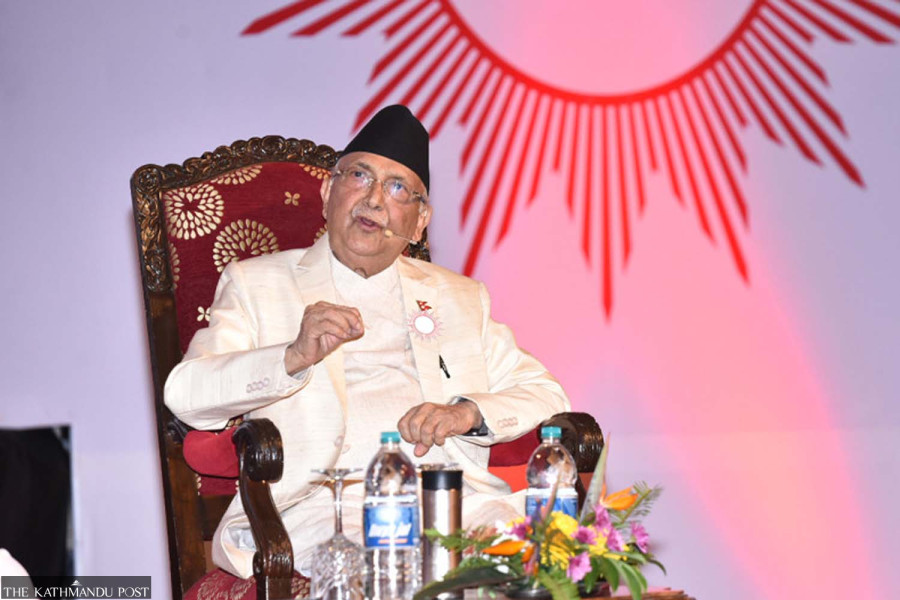Politics
UML manifesto dusts off KP Sharma Oli’s past promises
Party blames the Maoist Centre for NCP-led majority government’s failure to deliver in its three years in office.
Tika R Pradhan & Purushottam Poudel
When the banker Anil Keshari Shah questioned CPN-UML Chairman KP Oli during a ‘live debate’ at a five star hotel in Kathmandu on how he had squandered a rare chance to propel the country to prosperity after securing a near two-thirds majority in the 2017 elections, the former prime minister had no satisfactory answers.
Instead, Oli blamed other leaders of the then Nepal Communist Party (NCP) and carried on making lofty promises, claiming no other party in the country except the UML has a vision, commitment and experience to develop the country.
The party unveiled its election manifesto on Tuesday, listing out the ‘achievements’ of the government led by the late UML leader Manmohan Adhikari in 1994-95, and the immediate past government led by Oli himself. But there was no mention of the work of the previous UML governments led by Madhav Nepal and Jhananath Khanal—the two leaders who last year split the party to form the CPN (Unified Socialist).
In May 2018, Oli became the chairman of the Nepal Communist Party (NCP), which was formed after a merger between the UML and the CPN (Maoist Centre), and led the government with a near two-thirds majority for over three years.
While claiming that the previous government under his leadership was not in a comfortable position, Oli appealed to the public to once again give his party a majority in the November 20 elections for federal and provincial assemblies.
“The government formed under our leadership after the 2017 polls was not a comfortable one since we [CPN-UML] did not have a clear majority and we were compelled to partner with another party [CPN (Maoist Centre)],” Oli said at the manifesto unveiling function.
The party in its manifesto has argued that the previous administration under his leadership could not live up to people’s expectations for lack of a clear majority. Nevertheless, the manifesto has claimed credit for the good works of the NCP-led government.
The UML had contested the last elections in alliance with the CPN (Maoist Centre) promising to bring prosperity and stability to the country. As promised during the elections, they merged their parties and formed the NCP with two chairmen—Oli and Pushpa Kamal Dahal. Oli led the NCP government. However, the merger was short-lived owing to Oli’s ‘arbitrary attitude’. The party imploded resulting in the toppling of his government.
Oli, who created a niche for himself with his incredible ambitions, plans to continue in the same vein. The party again reiterated his pledge to operate Nepal’s own ships bearing the national flag on Nepal’s rivers.
The NCP-led government also set up a shipping office in Lalitpur, but the office remains dysfunctional.
Like all other major parties—the Nepali Congress, the CPN (Maoist Centre) and the CPN (Unified Socialist)—the UML has also made lofty promises, but in a different way. It has termed its promises as ‘guarantees’ and has listed out 20 of them in its manifesto which the party promises to implement.
The manifesto has promised to fulfil them in the next five years, if the party wins a majority. Prosperity remains the party’s prime priority, but the manifesto has failed to justify how the party can achieve it.
The slogan ‘Make In Nepal’ incorporated in its manifesto as another ‘guarantee’ which resembles the slogan of India’s Bharatiya Janata Party, which says, ‘Make In India.’
The manifesto further stressed that a UML-led government is a must for the promotion and safeguarding of sovereignty.
The UML has expressed commitment to make structural reforms so as to end the existing hurdles on the path to national prosperity.
“Policies that are obstacles to prosperity will be reviewed. State-owned corporations and enterprises that have turned defunct due to excessive politicisation will be made functional and professional through restructuring,” states the manifesto.
The manifesto has made a number of promises to the public.
Meanwhile, the party has failed to give convincing reasons for its dissolution of Parliament twice, despite knowing that the ruling alliance has been making the dissolutions its major election agenda.
Although Oli, over the past few years, has been publicly expressing his displeasure with provincial governance, the manifesto prepared by his party states that the province will be made a facilitator of progress.
The manifesto is silent on the issue of secularism.




 13.12°C Kathmandu
13.12°C Kathmandu
















